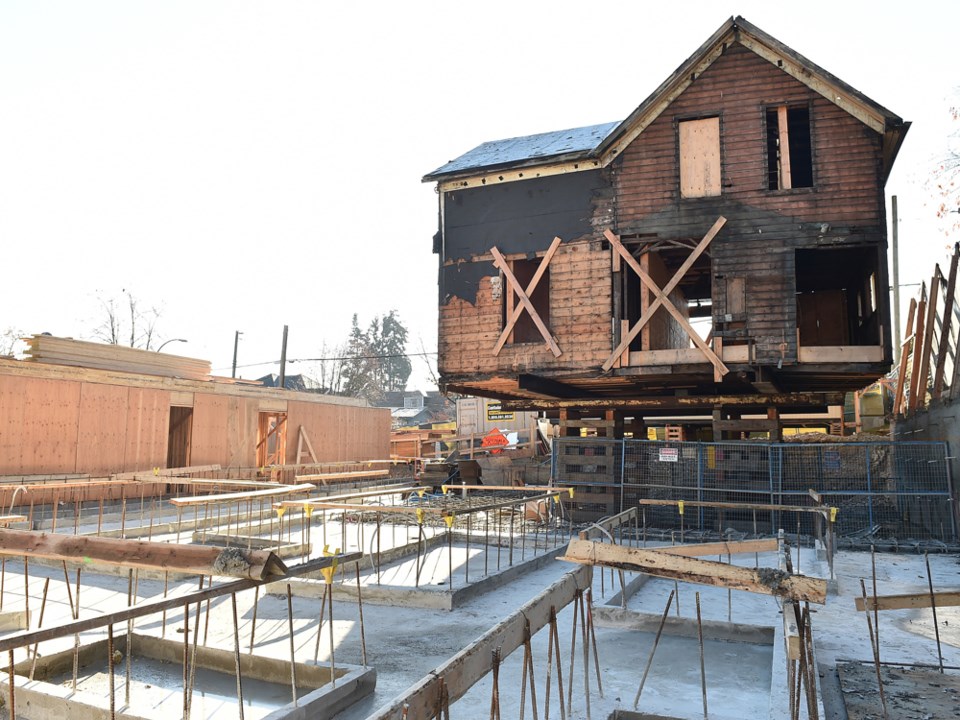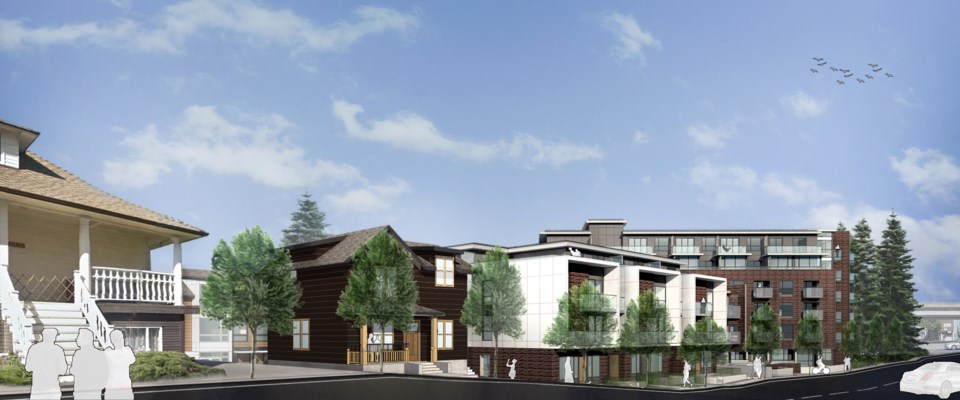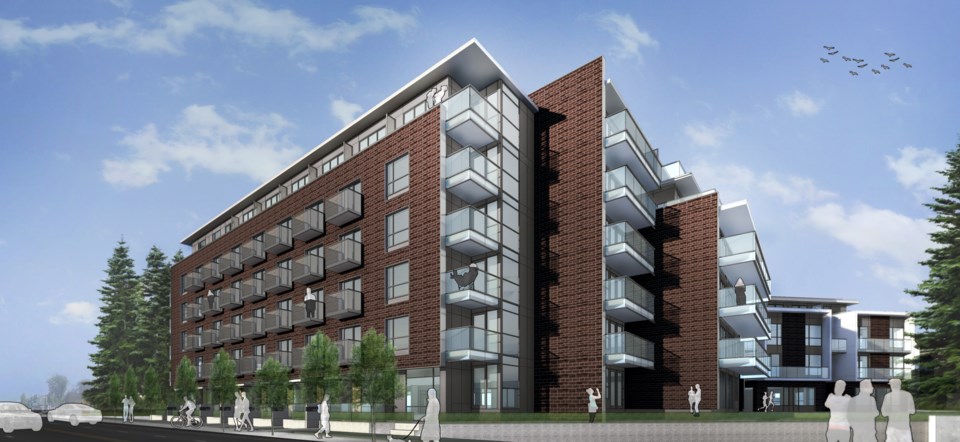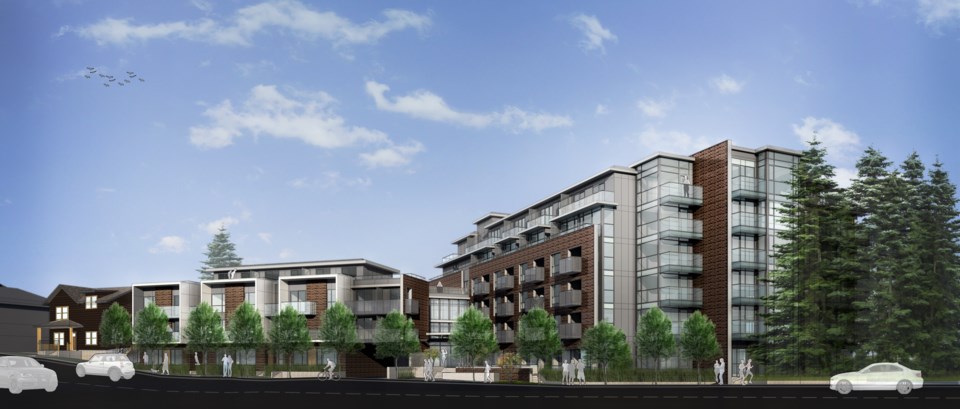A federal government program for construction loans delivered through the Canadian Mortgage and Housing Corporation has helped a new rental building at 1771 East 18th “see the light of day,” according to Cressey Development Group vice president Jason Turcotte.
Turcotte and Jean-Yves Duclos, the federal Minister of Families, Children and Social Development and minister responsible for Canada Mortgage and Housing Corporation, spoke about the program — the Rental Construction Financing Initiative — at a Nov. 19 press conference at the construction site for Cressey’s “Conrad” project on East 18th.
Once completed in September 2019, it will provide 111 rental units geared towards middle class families in two attached buildings — one that's three-and-a-half-storeys and another that's six-storeys — as well as four more units in a three-storey infill townhouse and two-storey restored heritage house.
The 1911 heritage home was relocated from one area of the site to another. It was owned by the Conrad family for which the rental project is named.
More than 60 per cent of the units in the development will have rents at or lower than 30 per cent of median household income in the area. Through an agreement with the City of Vancouver, this affordability level will be maintained for 60 years.
Ěý

Ěý
Duclos said demand for housing in Â鶹´«Ă˝Ół»has far outstripped supply, and affordability has worsened due to the rental market vacancy rate being at a near-record low of .09 per cent.
“This, of course, has driven up costs to the point where the very people who work hard to make our cities and Â鶹´«Ă˝Ół»run [unable to] afford to live in them,” he said. “Teachers, nurses, construction workers, clerks — many of these middle class families and workers find it impossible to live, work and make ends meet in our urban centres.”
He said projects supported through the Rental Construction Financing Initiative will provide much-needed relief for those who don’t qualify for assisted housing but also can’t afford market rents.
The Rental Construction Financing Initiative provides low-cost construction loans for 10-year terms to enable developers such as Cressey Development build affordable rental housing in markets where it’s needed most, according to Duclo.
In the case of the Conrad, Cressey received a loan of about $40 million to create the 115 rental units.
“This gives developers stable, predictable and low cost [loans] in the earliest stages of risky development. The loans are ensured by CMHC, which means the developers can get preferred interest rates and they can more easily renew their mortgage loans throughout the life of the project,” Duclos said.
The program, part of the federal government’s National Housing Strategy, was launched a year and a half ago — in April 2017.
In the 2018 budget, the government increased the fund by 50 per cent. Over the next three years, Duclos expects it will create about 14,000 new rental units for middle class families across Canada.
To qualify, projects must meet affordability, energy efficiency and accessibility criteria.
Ten per cent of the units in the Conrad will be accessible, all of its units will be adaptable or universal, it will be 23 per cent more energy efficient than required by national building codes, and it will achieve an 18 per cent reduction in greenhouse gas emissions.
Ěý

Ěý
Turcotte said it’s becoming increasingly difficult to construct rental buildings. He said historically low interest rates and municipal rental housing policies, such as the City of Vancouver’s Interim Rezoning Policy for Affordable Housing Choices and the Rental 100 program, have helped over the past decade.
“In spite of this positive climate, the supply of rental housing over this period of time, although vastly improved from decades prior, has fallen short of demand, resulting in unprecedented upward pressure on the cost of rental housing,” he said. “Now that window is closing. With rising interest rates, soaring land and construction costs, we are at risk of the supply drying up, which will only exacerbate an already critical shortage.”
Turcotte maintains the National Housing Strategy’s goal of facilitating construction of purpose-built rental housing is critical in the effort to address Vancouver’s affordability crisis.
“In face of these aforementioned threats to the viability of new rental housing development, the Rental Construction Financing Initiative, which we are thrilled to be a part of, has helped to ensure the project we’re standing in front of has seen the light of day, as it will for many other such projects across the country,” he said.
Getting the Conrad built hasn’t been easy. The site featured five single-family homes, including the heritage house. One of the lots was owned by the city.
As the project was going through rezoning, . A group called Cedar Cottage Area Neighbours argued it was too high, too dense, it would result in the loss of too many mature trees, and it wasn’t compatible with the single-family neighbourhood.
But rezoning, which was considered under the city’s Interim Rezoning Policy for Increasing Affordable Housing Choices, was ultimately approved in 2016. After rezoning, the city sold its lot to Cressey.
Turcotte acknowledged the rezoning was complicated and took about five years. During that period, he said there were five consecutive interest rate hikes and double-digit construction cost increases.
While the process created some benefits, he said its length made the project more expensive to produce.
“The long process, although somewhat necessary and often with some good result, [does] have a price, for sure,” he said.
When asked what he would say to residents that fight against similar projects, Turcotte said: “I would encourage them to keep an open mind, to recognize that housing is a need and likely the house they live in wasn’t always there either. It’s very rare that we finish a project and have communities that don’t actually appreciate the contributions that that new project brings. I appreciate change is often a scary thing but usually the benefit at the end is very welcome.”
Ěý

Ěý

Ěý
@naoibh



